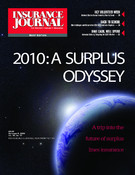Developing new business is an integral part of every insurance agent’s regimen. There are endless ways to go about looking for new business, however, successful agents know how to focus their efforts to engage in the most efficient methods possible.
Most businesses derive 80 percent of their revenues from the top 20 percent of their customers. The key is to expand upon the relationships already formed with customers and tap into the relationships that have been made with their insurance companies in order to generate new business. Successful producers know that, having already established working relationships with these people and given that both parties share the same target-market, they are in a position to tap their brains for new ideas.
Do they have a need for any additional coverages or services? Are they aware of any other businesses that would have a need for similar products and services? Would they be able to refer any individuals or businesses that would help in penetrating new target markets? What sort of additional products and services would be of interest to them and their business?
Whether an agency owner is a one-person agency or a mega-brokerage, agencies must approach developing new business as a team effort. Any source that can help them engage in new business is part of the team. They include customers, insurance companies, partners, friends, and everyone else who can introduce new ways to market the agency.
Successful agents reward individuals and other businesses that help them penetrate new target markets and bring in additional customers. They create arrangements that stand to benefit both themselves and the individual or business they are working with. They probe the minds of existing customers to learn about any new types of coverages and services they may need. Through this investigation they may find advocates that share their passion or even receive feedback for new ideas that result in their next wave of insurance products and services.
Adapting to market changes
Every industry is constantly in a state of change. Really successful agents find ways to innovate, build and advance their business. Every industry will always have new products, services, and technological advancements that alter the way business is conducted. By understanding the elemental factors that affect these changes, flourishing agents will be in the position to capitalize on new business developments as the marketplace changes.
The innovative agent considers the following: What sort of new products and services would allow expansion into different target markets? What factors will shape the landscape of the industry next year, in two years, and in five years from now? Which parts of the business will stand to gain the most from these developments?
The agents that are ready for these changes stand to gain the most. Being able to project their knowledge of the industry into the future and understanding the effects of new marketplace developments will enable the agent to uncover valuable new business opportunities.
Forward thinking agents are able to use the resources readily available to them to develop a steady stream of new business initiatives and create a foothold for themselves that can be leveraged into even greater opportunities.
New business drives companies in every industry and is a major factor in the future of every business. Those agents that are continuously looking for and executing new business development endeavors will be the ones that capture market share and successfully position themselves in the marketplace to go even further.
Targeting lost accounts
Another great source for new business is re-soliciting lost accounts. Many agencies spend countless unfruitful hours quoting unqualified prospects. A great source of new business could be lost business. We have all lost good accounts for bad reasons. And many times we could recapture those accounts simply by re-soliciting them. Establishing a proper cancellation program could ensure both increased retention and a source of new business.
There are three goals to the any cancellation procedure: 1) Determine the cause so that the agency can prevent future erosion of business. 2) Protect the agency from an errors and omissions exposure caused by incorrect termination of coverage. 3) Regain the account on the next anniversary, if possible.
Most agencies plan, measure and record the sale of new business, but very few take the time to really control the loss of business to the agency. No agency really profits if business keeps coming in the front door and going out the back.
Next, it is important to realize that unless there is proper documentation, an uncovered loss will usually result in an errors and omissions claim being filed against an agency. Since most E&O deductibles are well over $1,000, it is in the interest of the agency to not add insult to injury. That is, lose the account and then suffer another monetary loss with an E&O deductible.
Re-soliciting lost accounts
Finally, it is important when a policy is cancelled that the customer service representative/marketer or the producer decide whether this customer is to be re-solicited. Many customers who leave an agency regret their choice, but fail to return to the agency because they are too embarrassed for leaving in the first place.
This embarrassment can be easily overcome by conducting a cancellation interview and by re-soliciting the account on the next anniversary. This will usually make the client a better customer. Remember, you should only re-solicit a profitable and good account. An agency can ill afford to re-solicit an account that is unprofitable or is difficult to service.
Sixty days prior to expiration the CSR or salesperson should call the lost account and say, “This is James Smith from the XYZ Agency. We used to provide your personal/commercial insurance. We really hated to lose you as a customer. I just called to find out if your current agent has lived up to your expectations.”
Sometimes the former customer will say, “Yes.” The CSR/salesperson should say, “I can appreciate that, but if they ever fail to live up to your expectations, I would hope that you would call me, because I would really like to provide for your insurance needs again.”
Obviously, if the former customer is dissatisfied with their current agent, the CSR/salesperson should attempt to re-solicit the account.
Quoting unqualified prospects over the phone, as opposed to re-soliciting good and qualified lost accounts, is like fishing for minnows off the back of a whale.
Finally, proper handling of endorsement requests can also lead to more sales.
The ultimate goal for an automated agency would be to have endorsements processed as follows: 1) customer calls with a change; 2) the CSR/marketer enters the change into the computer and updates the customer’s file; 3) the change is transmitted to the company; and 4) the paper endorsement is issued and e-mailed to the customer.
This procedure, however, dictates that there be “Single Entry Interface” with all of the agency’s companies. This does not appear to be an option in the foreseeable future, although IVANS’ ‘Transformation Station” program is making great strides in this area.
The procedure for processing commercial lines endorsements is realistic in that it incorporates the reality of the need for paper or electronic mail to be used with most companies.
Finally, any time there is a positive contact with a customer, there should be an attempt to add additional coverages or policies. The CSR/account manager closing the conversation in the following way would accomplish this:
“By the way, I notice that we haven’t done a review of your insurance needs in five years. We find that many times our customers have had material changes in their business. In fact, we find that sometimes they are still insuring items or exposures that don’t even exist anymore. Do you have a few minutes for me to review your current exposures on the chance that we can save you some money?”
Another approach might be: “By the way, I notice that you have no coverage for business interruption. Did you know that most businesses fail to open after a major fire even though they carry fire insurance on their buildings and contents? Most businesses can’t survive the three months to a year it takes to rebuild their building with no income. Would you be interested in knowing more about this valuable protection?”
Training the CSR/account manager in these techniques will make your agency more professional and profitable, while also providing another line of defense from errors and omissions losses.
Jack Fries is the owner of Alexandria, Ky.-based Fries & Fries Consulting, an automation, sales and management consulting firm specializing in independent insurance agencies. He can be reached at
(859) 441-4528 or by e-mail at: jfries@jackfries.com.
Topics Agencies Profit Loss
Was this article valuable?
Here are more articles you may enjoy.


 Marsh Awarded Injunction Against Former Employees Now With Howden US
Marsh Awarded Injunction Against Former Employees Now With Howden US  Meta Loses Insurance for Defense in Major Social Media Addiction Litigation
Meta Loses Insurance for Defense in Major Social Media Addiction Litigation  Kyle Busch and Wife Settle Lawsuit With Pacific Life and Insurance Agent
Kyle Busch and Wife Settle Lawsuit With Pacific Life and Insurance Agent  Ford Recalling 4.3 Million US Vehicles Over Software Issue
Ford Recalling 4.3 Million US Vehicles Over Software Issue 


